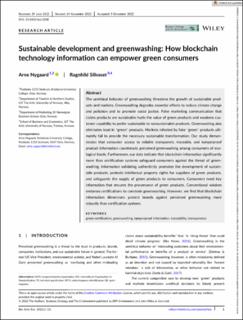Sustainable development and greenwashing: How blockchain technology information can empower green consumers
Peer reviewed, Journal article
Published version
Permanent lenke
https://hdl.handle.net/11250/3054931Utgivelsesdato
2022Metadata
Vis full innførselSammendrag
The unethical behavior of greenwashing threatens the growth of sustainable products and markets. Greenwashing degrades essential efforts to reduce climate change and pollution and to promote social justice. False marketing communication that claims products are sustainable hurts the value of green products and weakens customer capability to prefer sustainable to nonsustainable products. Greenwashing also eliminates trust in “green” products. Markets infected by fake “green” products ultimately fail to provide the necessary sustainable transformation. Our study demonstrates that consumer access to reliable transparent, traceable, and tamperproof product information counteracts perceived greenwashing among consumers of ecological foods. Furthermore, our data indicate that blockchain information significantly more than certification systems safeguard consumers against the threat of greenwashing. Information validating authenticity promotes the development of sustainable products, protects intellectual property rights for suppliers of green products, and safeguards the supply of green products to consumers. Consumers need key information that ensures the provenance of green products. Conventional wisdom endorses certifications to constrain greenwashing. However, we find that blockchain information dimensions protect brands against perceived greenwashing more robustly than certification systems.

